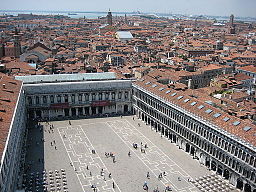45°26′3″N 12°20′16″E / 45.43417°N 12.33778°E
 view of Saint Mark's Square Procuratie Nuove (left), Procuratie Nuovissime (centre), and Procuratie Vecchie (right) | |
| Procuratie Vecchie | |
| Built | c. 1514–1538 |
|---|---|
| Architect | Pietro Bon and Zuan Celestro (attributed) |
| Architectural style(s) | Early Renaissance |
| Procuratie Nuove | |
| Built | 1583–c. 1660 |
| Architect | Vincenzo Scamozzi and Francesco Smeraldi |
| Architectural style(s) | High Renaissance |
| Procuratie Nuovissime | |
| (Napoleonic Wing) | |
| Built | 1807–1815 |
| Architect | Giovanni Maria Solis |
| Architectural style(s) | Neoclassical |
The Procuratie (English: Procuracies) are three connected buildings along the perimeter of Saint Mark's Square in Venice, Italy. Two of the buildings, the Procuratie Vecchie (Old Procuracies) and the Procuratie Nuove (New Procuracies), were constructed by the procurators of Saint Mark, the second-highest dignitaries in the government of the Republic of Venice, who were charged with administering the treasury of the Church of Saint Mark as well as the financial affairs of state wards and trust funds established on behalf of religious and charitable institutions.
The Procuratie Vecchie on the northern side of the square was built during the War of the League of Cambrai in the early sixteenth century to replace an earlier structure, damaged by fire. Although the war imposed financial constraints and limited innovation, it was nevertheless the first major public building in Venice to be erected in a purely classical style. It always contained apartments that were rented by the procurators as a source of revenue to finance building projects and repairs. Rental income was significant, given the prestige of the location. But the apartments were eventually sold to raise immediate money for the government, and several of them were subsequently transformed into clubhouses.
The Procuratie Nuove on the southern side housed the official residences of the procurators. Built between the late-sixteenth and mid-seventeenth centuries to replace a series of dilapidated medieval structures, it represented the culmination of an extensive programme of urban renewal that lasted over a hundred years and profoundly transformed Venice's city centre, giving it the appearance of a great classical forum. Both the official residences in the Procuratie Nuove and the rental apartments in the Procuratie Vecchie were built above arcades with space on the ground floor that was rented out for stores, workshops, and later coffeehouses, including the historic Caffè Florian, Caffè Quadri, and Caffè Lavena.
The Procuratie Nuovissime (Newest Procuracies, also known as the Napoleonic Wing) was built during the second period of French occupation (1805–1815) when after the fall of the Republic of Venice, the Procuratie Nuove was transformed into the residence of the viceroy of the Kingdom of Italy. Today, much of the Procuratie Nuove and the Napoleonic Wing house the Museo Correr.
